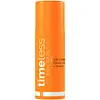What's inside
What's inside
 Key Ingredients
Key Ingredients

 Benefits
Benefits

 Concerns
Concerns

No concerns
 Ingredients Side-by-side
Ingredients Side-by-side

Water
Skin Conditioning3-O-Ethyl Ascorbic Acid
Skin ConditioningTetrahexyldecyl Ascorbate
Antioxidant3-Glyceryl Ascorbate
AntioxidantGlycerin
HumectantPentylene Glycol
Skin ConditioningPropylheptyl Caprylate
EmollientGlyceryl Stearate Citrate
EmollientCoco-Caprylate/Caprate
EmollientAcetyl Zingerone
AntioxidantHydrogenated Lecithin
EmulsifyingHexylresorcinol
AntimicrobialPolyglyceryl-3 Stearate
EmulsifyingHydrogenated Phosphatidylcholine
EmulsifyingAllantoin
Skin ConditioningMicrocrystalline Cellulose
AbsorbentSodium Stearoyl Glutamate
CleansingCellulose Gum
Emulsion StabilisingTocopherol
AntioxidantCitric Acid
BufferingSodium Phytate
Xanthan Gum
EmulsifyingWater, 3-O-Ethyl Ascorbic Acid, Tetrahexyldecyl Ascorbate, 3-Glyceryl Ascorbate, Glycerin, Pentylene Glycol, Propylheptyl Caprylate, Glyceryl Stearate Citrate, Coco-Caprylate/Caprate, Acetyl Zingerone, Hydrogenated Lecithin, Hexylresorcinol, Polyglyceryl-3 Stearate, Hydrogenated Phosphatidylcholine, Allantoin, Microcrystalline Cellulose, Sodium Stearoyl Glutamate, Cellulose Gum, Tocopherol, Citric Acid, Sodium Phytate, Xanthan Gum
 Reviews
Reviews

Ingredients Explained
These ingredients are found in both products.
Ingredients higher up in an ingredient list are typically present in a larger amount.
Tocopherol (also known as Vitamin E) is a common antioxidant used to help protect the skin from free-radicals and strengthen the skin barrier. It's also fat soluble - this means our skin is great at absorbing it.
Vitamin E also helps keep your natural skin lipids healthy. Your lipid skin barrier naturally consists of lipids, ceramides, and fatty acids. Vitamin E offers extra protection for your skin’s lipid barrier, keeping your skin healthy and nourished.
Another benefit is a bit of UV protection. Vitamin E helps reduce the damage caused by UVB rays. (It should not replace your sunscreen). Combining it with Vitamin C can decrease sunburned cells and hyperpigmentation after UV exposure.
You might have noticed Vitamin E + C often paired together. This is because it is great at stabilizing Vitamin C. Using the two together helps increase the effectiveness of both ingredients.
There are often claims that Vitamin E can reduce/prevent scarring, but these claims haven't been confirmed by scientific research.
Learn more about TocopherolWater. It's the most common cosmetic ingredient of all. You'll usually see it at the top of ingredient lists, meaning that it makes up the largest part of the product.
So why is it so popular? Water most often acts as a solvent - this means that it helps dissolve other ingredients into the formulation.
You'll also recognize water as that liquid we all need to stay alive. If you see this, drink a glass of water. Stay hydrated!
Learn more about Water